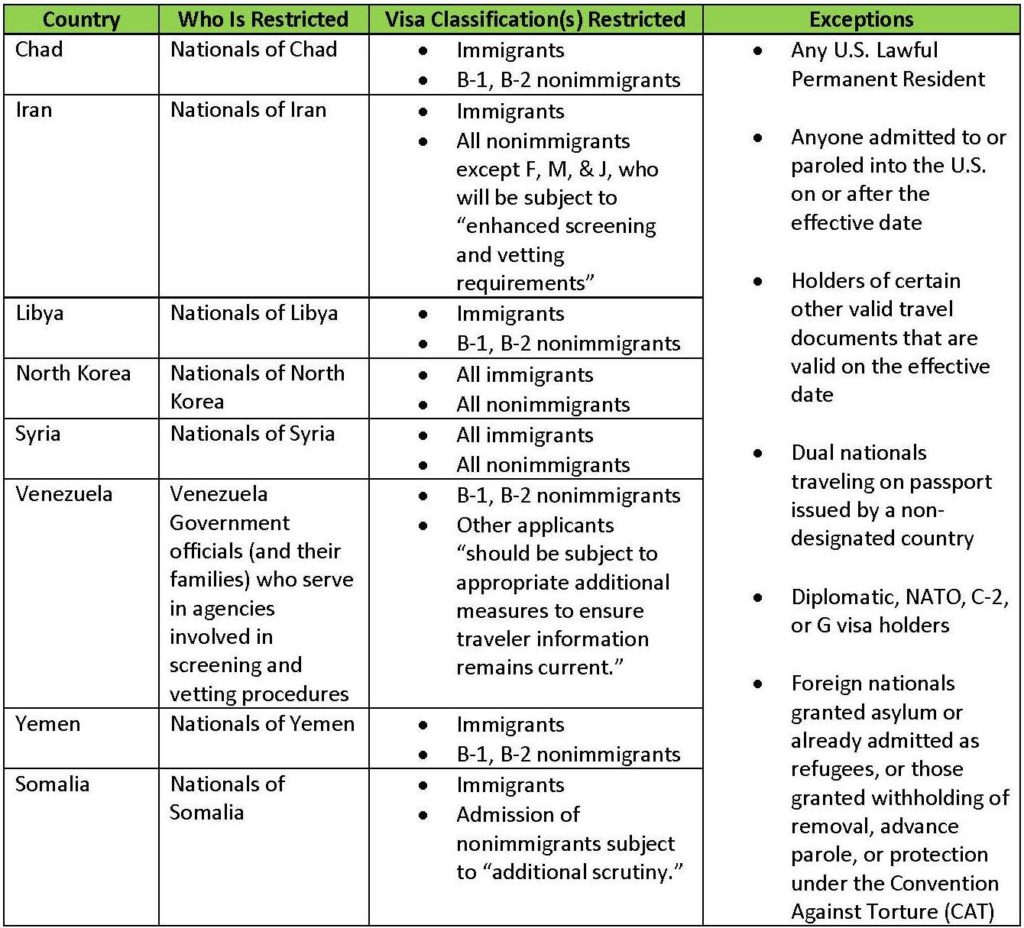On Sunday, September 24th, President Trump issued a Proclamation, “Enhancing Vetting Capabilities and Processes for Detecting Attempted Entry into the United States by Terrorists or Other Public-Safety Threats.” This new proclamation expands and extends the President’s previous “travel ban” just as it was expiring pursuant to court order issued under pending litigation challenging the ban, as reported in previous Foster Immigration Updates.©
Who Is Impacted?
The new proclamation provides greater detail on the criteria used to determine which countries’ nationals would be subject to the ban, and tailors the ban more narrowly on a country-by-country basis. The restrictions are different for each country and are summarized in the chart below.
Scope of Restrictions and Possible Waivers
The proclamation generally applies to foreign nationals referenced above who are outside the United States on the effective date and do not have a valid visa on the effective date. Those who are impacted and do not fall under one of the exceptions may apply for a waiver. The proclamation directs the Secretaries of State and Homeland Security to “coordinate to adopt guidance addressing the circumstances in which waivers may be appropriate for foreign nationals seeking entry as immigrants or nonimmigrants.” Waivers may be granted “only if a foreign national demonstrates to the consular officer’s or CBP official’s satisfaction” each of the following elements:
- Denying entry would cause the foreign national undue hardship;
- Entry would not pose a threat to the national security or public safety of the United States; and
- Entry would be in the national interest.
Individuals who secure a waiver must still demonstrate eligibility according to all other requirements of the requested visa category.
Effective Date
For individuals subject to the previous travel ban, the effective date of the proclamation is September 24th, the date the previous ban was to expire. For all other individuals, the effective date of the ban is October 18, 2017. The restrictions are in place indefinitely, though the proclamation provides that countries may be removed from the list upon meeting certain criteria listed in the proclamation with respect to “identity-management information”, “national security and public-safety information”, and “national security and public-safety risk assessment.”
Potential Legal Challenges
The inclusion of non-Muslim majority countries such as Chad, North Korea, and Venezuela, the specification of particular criteria used to evaluate a country’s inclusion on the list, and the provision for exceptions and waivers are all factors which could impact the likelihood of success in efforts to challenge the order in court.
Case-by-Case Consultations Recommended
The proclamation allows for case-by-case waivers and provides examples of circumstances wherein a waiver may be appropriate, though categorical waivers are disallowed. For a consultation to evaluate the applicability of the new travel restrictions to a particular applicant, or the potential availability of a waiver, contact your Foster LLP immigration attorney. Foster LLP will continue to monitor the introduction and implementation of travel restrictions, and the availability of potential waivers, and will make new information available as appropriate in future Immigration Updates© and on our firm’s website at www.fosterglobal.com.

